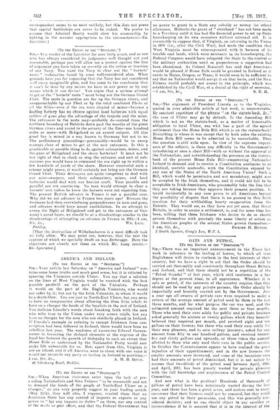[To THE EDITOrt OF THE " SPECTATOR."]
Six,—As a reader of the Spectator for over forty years, and as one who has always considered its judgments well thought out and reasonable, perhaps you will allow me a protest against the line of argument you have taken up recently on the action or inaction of our Navy. You want the Navy to clear out the " hornets' nests " (submarine bases) by some well-considered plan. What grounds have you for supposing that the Navy has not considered ad/ every imaginable plan, and has come to the conclusion that it can't lie done by any means we have in our power or by any means which it can devise? You argue that a serious attempt to get at the " hornets' nests " must bring out the German Grand Fleet. The nests in Question are far up the German rivers, and unapproachable by our Fleet or by the total combined Fleets of all the Allies—even if the sea were cleared of mines—because a floating battery has no chance against land batteries with equal calibre of guns plus the advantage of the torpedo and the mine. The entrances to the nests may—probably do—extend from the northern boundary of Holstein down past the mouths of the great German rivers and round to the estuary of the Ems—one hundred miles or more—with Heligoland as an armed outpost. All this great bay is mined in a way known to Germany but not to us. The preliminary proceedings—presumably—would he to sweep seaways clear of mines to get at the nest entrances. Is this a practicable or possible thing to do against submarines, mines, and the guns of Heligoland and the shore batteries? It must not be lost sight of that to check or stop the entrance and exit of sub- marines you would have to command the sea right up to within a few hundreds of yards of the shore. However successful such a scheme might prove, it would certainly not bring out the German C rand Fleet. Their destroyers are quite competent to deal with our mine-sweepers, and their submarines, mines, and laud batteries would deal with our heavier craft. Your parable and Parallel are not convincing. No man would attempt to clear a hornets' nest unless he knew the hornets were not expecting him. The present British advance in France is not a parallel case. Why did we not advance in France two years ago? Because the Germans had then overwhelming preponderance in men and guns, and advance would have meant annihilation. In an attempt to sweep the Bight of Heligoland and get to the entrances of Ger- many's naval bases, we should be at a disadvantage similar to the disadvantage of attempting an_advance in France in 1915.—I am, [That the destruction of Wilhelmshaven is a most difficult task we fully allow. We may point out, however, that the nest the capture of which we specially dwelt on was Zeebrugge. Here the objections are clearly not those on which. Mr. Lang insists.— En. Spectator.]


























 Previous page
Previous page